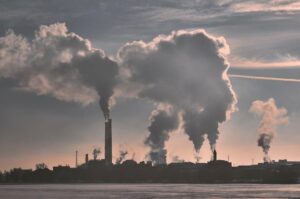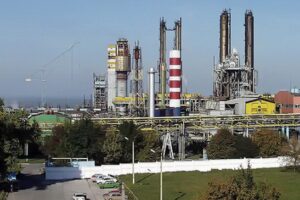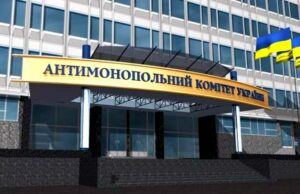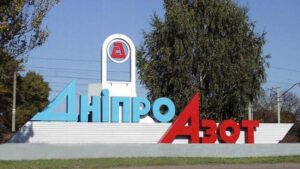
JSC Dniproazot (Kamensk, Dnipropetrovsk region) reported a loss of UAH 1.329 billion for 2024 and does not plan to consider profit distribution or pay dividends.
According to a publication in the information disclosure system of the National Securities and Stock Market Commission (NSSMC), at the annual general meeting, which will be held remotely on August 28, shareholders will be asked to approve the supervisory board’s report for 2024 without comments or additional measures, to recognize the supervisory board’s activities as satisfactory and to approve its work as consistent with its powers, goals, objectives, and areas of activity.
In addition, shareholders are invited to take into account the conclusions of the audit report of Standard-Audit LLC on the audit of the financial statements of JSC Dniproazot for 2024, but not to approve any specific measures in this regard. Instead, they want to oblige the Supervisory Board not to renew the contract with this audit company and to find another auditor.
The General Meeting will also amend the provisions on the remuneration of members of the company’s management bodies, in particular the Supervisory Board and the Management Board.
The shareholders will hear the management board’s report on the results of the reduction of the equity capital of JSC Dniproazot and instruct the chairman of the management board to file a petition with the commercial court to initiate preventive restructuring proceedings and bankruptcy proceedings against JSC Dniproazot.
At the end of the general meeting, the shareholders will consider the issue of liquidating JSC Dniproazot in accordance with and in compliance with the requirements of Part 2 of Article 16 of the Law of Ukraine “On Joint Stock Companies.”
Dniproazot JSC is a chemical company in Ukraine, a major producer of ammonia and nitrogen fertilizers, specializing in the production of ammonia, urea, caustic soda, chlorine, and hydrochloric acid. It was founded in 1996 and is one of the five largest chemical companies in the country.
Currently, it is the only company in Ukraine that produces liquid chlorine, which is used for sterilizing drinking water and treating wastewater. Over 80% of its products are supplied to countries in Europe, Asia, and Latin America.
According to Opendatabot, in 2024, Dniproazot reduced its revenue by 7.6 times to UAH 184.05 million, its debt obligations by 4.2% to UAH 1.3 billion, and increased its net loss by 5.4 times to UAH 1.349 billion. Its assets are estimated at UAH 1.553 billion, compared to UAH 2.904 billion a year ago. The number of employees decreased by 440 to 2,636.
The beneficiaries of the company are Dimsy Equities Ltd (23%), Celastrina Trading Co. Limited (7.38%), and Dzer
Dniproazot, loss

The Commercial Court of Kyiv on Thursday rejected Dniproazot JSC’s claim to invalidate and cancel the decision of the Antimonopoly Committee of Ukraine dated December 29, 2021 on the violation by the enterprise of legislation on the protection of economic competition and a fine of UAH 80.11 million.
“The Antimonopoly Committee will continue to defend its position on this case if Dniprozot continues to appeal against this in the highest courts,” the ministry said in a statement.
The Antimonopoly Committee of Ukraine recalled that during the investigation, the monopoly (dominant) position of the enterprise in 2017-2019 in the commodity market was established and it was proved that it abused this provision, in particular, stopped the production of goods from 06/18/2018 to 07/19/2018 and stopped its sale from 07/01/2018 to 07/19/2018.
“The main reason for stopping the production of Dniproazot was the increase in the cost of natural gas and the lack of working capital. At the same time, the Committee did not reveal significant changes in the cost of natural gas and established the presence of working capital in the company’s accounts,” the ministry said in a statement.
The Antimonopoly Committee also recalled that the issue of setting prices for Dniprozot in the period of 2017-2019 is being investigated by the committee as part of another case.
JSC “Dniproazot” specializes in the production of carbamide, ammonia, sodium hydroxide, liquid chlorine and hydrochloric acid and is controlled by the structures of the Privat group.
In January-September 2021, the enterprise reduced its net profit three times (by UAH 228.3 million) compared to the same period last year, to UAH 113.1 million. Its revenue for the nine months of this year increased by 43.2% – up to UAH 5 billion 734.8 million.

The Antimonopoly Committee of Ukraine (AMCU) on Wednesday imposed a UAH 80.11 million fine on JSC Dniproazot, a monopolist in the liquid chlorine market, due to the suspension of its production and sale.
“The stopping of production of liquid chlorine by the enterprise during the period from June 18, 2018 to July 19, 2018 and the termination of its sale from July 1, 2018 to July 19, 2018 are recognized as abuse of a monopoly (dominant) position in the market for the primary sale of liquid chlorine,” the committee’s press release says.
According to it, the company argued that production was stopped due to a significant increase in a gas price and the lack of working capital, but the AMCU, following an investigation, claims that there were no significant changes in the weighted average prices for the purchase of natural gas by the company.
In addition, it was established that at the time of the stoppage of production, Dniproazot had circulating and credit funds available for current settlements with counterparties and conducting business activities.
The Committee believes that among the motives for stopping production was the company’s desire to resume legal relations with JSC Ukrnafta to obtain cheaper raw materials and the company’s intention to raise prices for liquid chlorine.
Following the case consideration, it was established that during 2017-2019, Dniproazot was the only enterprise that produced liquid chlorine in Ukraine, with market shares of 99%, 78% and 68%, respectively, the report says.
The AMCU also noted that since the maximum reserves of liquid chlorine at water utilities could not exceed 15-30% of the daily requirement, some of them found themselves in a crisis situation, since they had limited chlorine residues.
“During the period of Dniproazot’s downtime, meetings were held with the participation of government representatives, during which some water utilities warned about the threat of stopping the disinfection of drinking water… The technological process for purifying drinking water is continuous, so a delay in the reagent delivery could turn into an epidemiological catastrophe on a national scale,” the AMCU said.
The AMCU clarified that in July 2018, the price of goods sold by Dniproazot in tanks increased by 277%, in cylinders – by 133%.
The Committee noted that the issue of setting prices by the enterprise during 2017-2019 is being investigated in another antitrust case.
Dniproazot specializes in production of carbamide, ammonia, sodium hydroxide, liquid chlorine and hydrochloric acid and is controlled by the structures of Privat Group.

Ukraine has initiated a special investigation into imports of sodium hypochlorite into Ukraine (according to foreign economic activity code 2828 90 00 00), regardless of the country of origin and export.
According to the report in the Uriadovy Kurier newspaper, the Interdepartmental Commission on International Trade adopted the corresponding decision on May 19, having considered the statement of JSC Dniproazot.
Based on the results of the consideration, the Commission found that the application contained sufficient substantiated evidence, on the basis of which it can be assumed that imports of sodium hypochlorite to Ukraine were carried out in such volumes and on such conditions that could cause significant harm to the national producer.
Within 30 days from the date of publication of this report, the Ministry of Economy registers the interested parties of the special investigation and considers the requirements for holding hearings.
According to the State Statistics Service, imports under a broader code (other hypochlorites) in the first quarter of 2021 amounted to almost 1,500 tonnes for $500,000, including from Italy – 90 tonnes for $160,000 and Russia – 75 tonnes for $120,000.